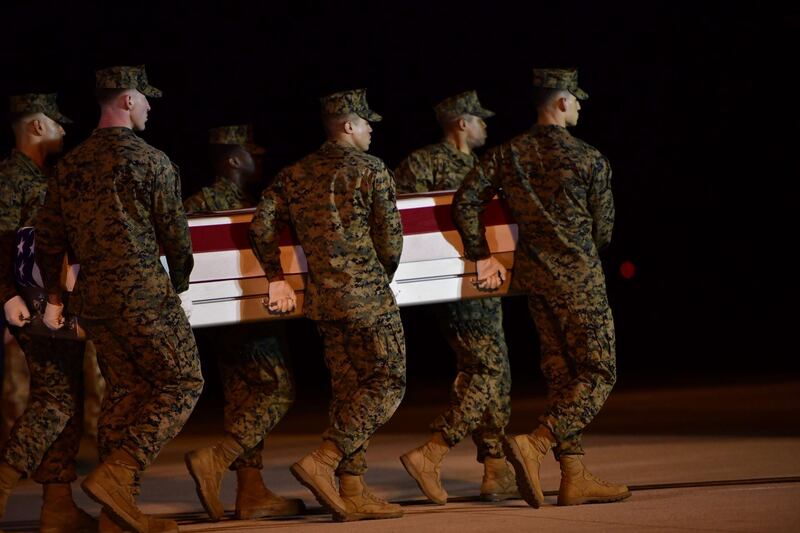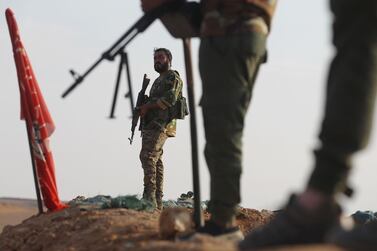The deadly rocket attack on an Iraqi base hosting troops from the international anti-ISIS coalition underlines the seriousness of a new threat that risks detracting from the fight against remnants of the militant group in the country.
American officials said the attack, which killed two US and one British servicemen, was most likely carried out by Kataib Hezbollah, one of a group of Iran-backed Iraqi militias that supported the government's fight against ISIS.
The rocket strikes came just days after two US Marines were killed in a joint operation with Iraqi special forces against ISIS in northern Iraq, making this the deadliest week for the coalition in two years.
Iraqi bases hosting the US contingent of the coalition have witnessed a series of low-level attacks since last year that Washington has blamed on Iraq's Iran-backed militias. They have come as Tehran feels the pressure of US sanctions aimed at reining in its nuclear activities and regional interference through proxy forces.
Although no group has claimed responsibility, Wednesday’s attack fits exactly with the pattern of previous attacks – at least 20 this year – although none have been as deadly. The last fatality was in late December, when a US contractor was killed at a base near Kirkuk, sparking a spiral of retaliation that would eventually result in the killing of Iranian Revolutionary Guard commander Gen Qassem Soleimani in a US drone strike at Baghdad airport.
Iran responded with missile attacks on Ain Al Assad air base in Anbar that caused no deaths but left more than 100 US soldiers with mild traumatic brain injuries.
These incidents demonstrate that the anti-ISIS coalition’s Operation Inherent Resolve now faces simultaneous challenges: militants exploiting security gaps created by internal political divisions and increasingly aggressive behaviour from Iranian-backed militias. If attacks such as the one on Wednesday increase, efforts against ISIS may be stunted.
“If it’s just one potentially lethal heavy rocket strike every two or three months, that’s something the coalition can probably handle without a big impact on their op tempo," said Alex Mello, a security analyst at the energy consulting firm Horizon Client Access.
"It will raise questions at a political level as to whether this mission is worth it or not. At the tactical level, the coalition has shown that it can keep up the tempo of counter-ISIS operations while under pressure from Iran-backed harassment attacks," Mr Mello told The National.
“If this strike is the prelude to an intensified pattern of Iran-backed rocket strikes undertaken with lethal intent in addition to harassment attacks, then things are going to get more difficult," he said.
“The coalition is going to have to shift mostly to self-protection, you’ll see the tempo of joint counter-ISIS ops with the Iraqi security forces going down and you’re going to see a lot more pressure at the political level in the US to sort this out.”
The fallout from Suleimani’s killing saw anti-ISIS operations suspended for three weeks, providing respite for the group from a campaign that has hunted them relentlessly for more than five years.
What remains of ISIS is now largely confined to the so-called disputed territories, areas that straddle the country’s internal border between Kurdish and federal government jurisdiction. Although just a few hundred metres wide in places, in others, it stretches to 40 kilometres.
US officials estimate the group has tens of thousands of fighters left in Iraq, most of them living in caves and mountains in these disputed territories. The fear is that if left unpursued, they might extend their reach beyond their hideouts. Attacks such as the one on Wednesday make that pursuit more difficult, and as was demonstrated in January, risk putting it on hold entirely.
The militants’ threat has been made clear in recent weeks – in the killing of the two Marines in Sunday’s operation in Makhmour and farther away in disputed territories close to the Iranian border, which has seen a spate of kidnappings.
As one former Iraqi security official told The National: "If the Americans have too many plates spinning, they may drop one. The problem is, we cannot afford to drop the ISIS plate, we know what happens then."







